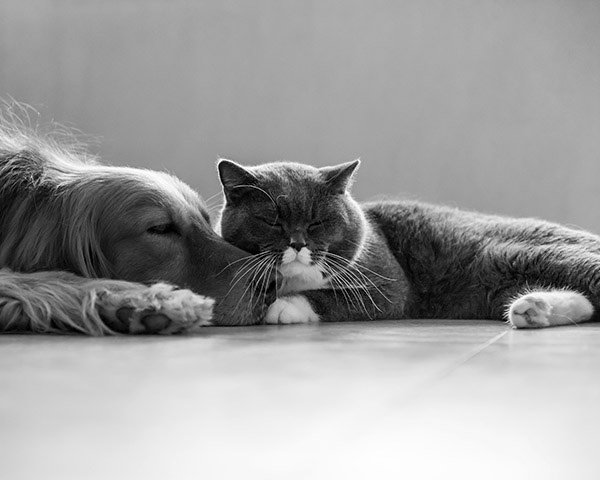Poodle dog breed information and advice
Poodles are noble and elegant, turning heads in the dog world with their famous curls. Said to have originated in France or Germany, Poodles descend from the old water dogs of Europe. So, despite their foppish looks, they’re quick-witted, well-built and easy to train.
The distinctive Poodle coat is thick and curly, but underneath there’s an athletic and sporty pooch.
There are four Poodle sizes: Standard, Medium, Miniature and Toy. Standard Poodles are the biggest and these large Poodles stand higher than 38cm at the shoulder. It’s also the oldest variety. The smaller varieties were bred by selectively breeding the smallest puppies from standard poodle litters.
Read on for information on how best to care for these curly companions, the Poodle temperament, training needs and more.
Standard Poodle facts

| Lifespan | The Poodle lifespan ranges from 10 to 18 years |
| How much | £500 - £1,800 |
| Size | Over 38 cm |
| Weight | 20 - 32 kg |
| Colours | Black, white, grey, blue, brown, apricot, cream, silver |
| Grooming | Every other day |
| Temperament | Clever, high-spirited, athletic |
| Exercise | Over two hours per day |
Insurance for your Poodle
Life doesn’t always go to plan, and your poodle pup could run into problems at any age. Having puppy insurance could help to alleviate some stress in these moments.
Our dog insurance from Sainsbury’s Bank could help you towards the cost of treatment, consultations, medication, ongoing care or even surgery.
Common health problems that can affect Poodles include:
Sainsbury’s Bank Pet Insurance
We offer new dog insurance cover for your Standard Poodle from eight weeks old.
These are the three cover options available with Sainsbury’s Bank Pet Insurance:
- Lifetime – the most comprehensive cover with access to up to £10,000 towards vet costs each year.
- Maximum benefit – offers cover for illnesses, accidents and conditions up to £6,000.
- Time limited – we can cover your pet for different treatments of up to £3,000, or for 12 months, whichever comes first.
Please note that we won't cover any pre-existing conditions and that terms, conditions, excesses, exclusions and limitations apply.
How to care for a Poodle
As with all breeds, your precious Poodle has certain grooming, feeding, training and exercise requirements they need to be met to be happy and healthy. Here’s how to keep your Poodle’s tail wagging.
Feeding and nutrition
Regardless of which size Poodle you choose, you’ll need to feed them nutritious food. Your vet, breeder or rescue centre will be able to advise on the right food for your dog. You can also check on the food packaging for guidance on the amount your pup needs.
Remember that things like their activity level, age and size will affect the amount of food your Poodle needs. Standard Poodles can be prone to bloating, so you may want to consider smaller more frequent meals throughout the day to minimise this.
Grooming
Poodles have a distinctively glamorous appearance, with a very dense and curly coat. Widley suitable for allergies (but not always!), Poodles do not shed hair. But, you do need to be prepared to put in the effort to look after their beautiful curls with daily brushing at home.
You should take your Poodle to the groomers every six weeks to be clipped.
Exercise
All sizes of Poodles need regular exercise as they’re very active dogs. They need at least an hour or two of walking and running, as well as extra training and playtime.
Standard Poodles love water and swimming – so keep this in mind if you want to avoid soggy paws. As working dogs, their instinct is to retrieve so they love playing fetch with their owners.
It’s important to keep all dogs mentally stimulated too by playing mind games and puzzles to keep their brains occupied and entertained.
Training
Thanks to their high intelligence levels, Poodles are great fun to train. They’re people-orientated and as long as the training is fun and positive for them, they’ll try to please you.
Poodles are excellent at agility, obedience and tracking so the world’s your oyster when it comes to training avenues. They love to perform – being a show off is a Poodle trait.
Poodle temperament and behaviour
The Standard Poodle temperament means they can make great family pets. But as high-energy dogs that need lots of exercise and attention, they may be better suited for families with older children that could share the responsibilities of walking and grooming. The Toy Poodle temperament is also very friendly, intelligent and keen to please.
Poodles are very social dogs, but without enough socialisation they can become anxious. They also love companionship and have a strong attachment to their owners, which can make them more likely to suffer from separation anxiety if left alone.
Common Poodle health problems
Before taking your Poodle home, it’s helpful to know what health problems are common in the breed so you can take any necessary steps for prevention or management. It’s important to take out dog insurance as soon as you can – as pre-existing conditions are not often covered.
Luxating Patella
This condition is caused when the Poodle’s kneecap slips out of its usual position. Luxating Patella is considered an inherited disease that affects either one or both of the dog’s back legs.
It’s more common in smaller breeds, like Toy Poodles, but knee problems are fairly prevalent in all poodle variations including Standard Poodles.
You may notice the following symptoms if your dog has Luxating Patella:
- Lameness
- Holding their leg up for a few steps or extending it behind them
- Skipping
- Weakness or hobbling
- Sudden yelps while running
- Inability to jump
Your dog will need to go to the vet for a physical examination to determine if they have Luxating Patella.
Hip Dysplasia
Hip dysplasia is most common in older Poodles, but Poodle puppies can show signs while they’re still young. This condition affects the ball and socket joint of the hips and causes them to not fit or develop correctly. It causes the bones to grind and deteriorate over time.
Although it’s hereditary, things like too much or too little exercise, improper weight and unbalanced nutrition can exacerbate the chances of it developing.
The main symptoms of hip dysplasia include:
- Decreased range of motion
- Swaying, or “bunny hopping”
- Reluctance rising, running or climbing stairs
- Stiffness
- Limping
Depending on the severity of the condition, treatments can vary from exercise restriction and weight reduction to anti-inflammatory medications and surgery.
Legg-Perthes disease
This painful condition most often affects small dogs, so Toy Poodles and smaller variations are more at risk. It’s quite common and occurs due to poor blood supply to the ball part of the hip ball and socket joint.
The lack of blood causes the bone to crumble, and results in a stiff and painful hip joint. This will cause your Poodle to limp when they walk and can lead to arthritis.
Keep an eye out for the following symptoms of Legg-Perthes disease:
- Stiffness and limping in one back leg
- Shrinking leg muscles
- Pain that worsens over time
Your vet will need to physically examine your dog’s back legs and hips. They will need an X-ray to determine if they have the condition.
So, is a Poodle right for you?
Poodles are active dogs, so you need to be sure you have the time to give them the stimulation they need. If you can meet their needs, you’ll be rewarded with an affectionate pup that’s great with families and easy to train.
Frequently asked questions
Is a Poodle a good family dog?
Yes, Poodles are good family dogs. They’re intelligent, energetic and easy to train. They love companionship and like to be around people most of the time. They’re gentle and can get along with children and other pets – especially if socialised from a young age.
What is the temperament of a Standard Poodle?
Standard poodles are known to be kind, friendly and loving. They’re also very energetic and eager to please. This makes training them a joy. As long as you meet their high energy needs, they can make great family companions.
Do Poodles bark a lot?
Yes, Poodles are known for being barkers. All the variations – from the smallest Toy to the largest Standard – are vocal dogs. Poodles often bark due to triggers – like the doorbell or when visitors arrive.

Browse our guides
Choose from our list of helpful guides and information

Explore dog breeds
Find out how to keep your dog healthy and happy

Cat breed guides
How to care for your cat, common health problems and more
Terms and conditions
Important information
* Guaranteed discount for Nectar members: The discount is based on information related to you and the transactions you've made with Sainsbury's supermarkets and Sainsbury's Bank using your Nectar card. For more information go to sainsburysbank.co.uk/nectar.
Sainsbury's Bank plc, Registered Office, 33 Charterhouse Street, London, EC1M 6HA (registered in England and Wales, no 3279730) is authorised by the Prudential Regulation Authority and regulated by the Financial Conduct Authority and the Prudential Regulation Authority (register no. 184514).
Sainsbury's Supermarkets Ltd is an appointed representative of Sainsbury's Bank plc. Sainsbury's Bank plc acts as an introducer to Pinnacle Insurance Ltd who is authorised by the Prudential Regulation Authority and regulated by the Financial Conduct Authority and the Prudential Regulation Authority (register number 110866). Registered office: 4th Floor, Limelight, Elstree Way, Borehamwood, Hertfordshire, WD6 1JH. Sainsbury’s Bank Pet Insurance is arranged, administered and underwritten by Pinnacle Insurance Ltd. Sainsbury's Bank plc and Pinnacle Insurance Ltd are not part of the same corporate group.
We do not provide personal recommendations to customers.
